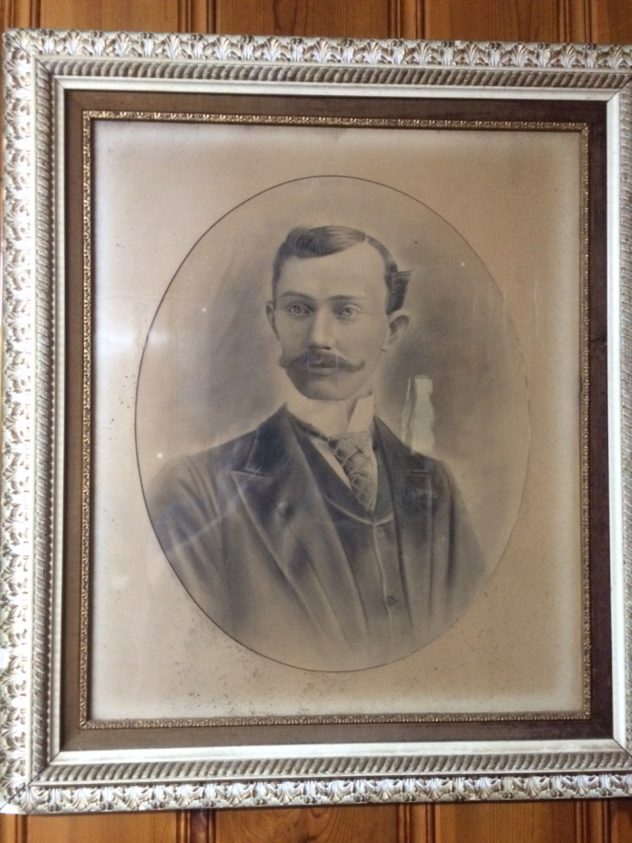
Portrait of Jena Cuthbert (J. C. ) Collier, probably made in the 1890s.
Jena (pronounced “geena”) Cuthbert, or J. C., Collier will be the subject of several future posts. Family records going well back into the 1800s document his life as a merchant, manufacturer, planter, industrialist, community leader, politician, and visionary.
His father, Isaac Cuthbert (I. C.) Collier, returned from serving in the Army of the Confederacy to find he had lost everything to Wilson’s Raiders, the Union forces that drove eastward through Alabama and Georgia in the weeks after Robert E. Lee’s surrender. Jena was born the following year, in 1866, in a Georgia that had been turned upside down by the war. He saw his father, through hard work, recover from the ashes of the war and become one of the most successful cotton growers of middle Georgia. I. C. Collier’s largest plantation was situated in the valleys of Big Potato and Little Potato creeks and astride what was to become a branch line of Southern Railway. The plantation essentially became the town of Piedmont, with a railroad depot, a school, two churches, a dry goods store, post office, blacksmith shop, and cotton gin.
Like his father, Jena was motivated to succeed. In his letters, he claimed to have left the farm behind while a teenager and relocated to Barnesville, Georgia. There he finished his education and became involved in the mercantile business. Not content to simply buy what local suppliers offered, he learned to buy directly from manufacturers. He routinely made trips to such places as New York and Philadelphia where, as a hard bargainer, he returned with quality merchandise. He operated several stores in middle Georgia, and they were stocked with goods that were a cut above the rest, attracting the discriminating shoppers of the late 1800s and early 1900s. J. C. maintained his interest in at least one store until the 1940s.
In 1898, J. C. and I. C. Collier organized and built the plant for Oxford Knitting Mills in Barnesville. I. C. died in 1908. J. C.’s son, Durward Cuthbert (D. C.) joined the company in 1911 and the name was changed to Collier Manufacturing Company. The company, eventually renamed Collier Mills, operated several mills and maintained offices in New York and business interests in Canada. In 1924, Collier Mills was sold to the William Carter Company of Needham, Massachusetts.
When I. C. Collier died in 1908, son J. C. inherited his father’s 3,000-acre cotton plantation that was Piedmont, Georgia. Concurrent with his textile operations and mercantile businesses, J. C. became a successful farmer. He kept detailed records of farm and labor and applied a effective management style that yielded some of the best cotton crops in the region.
J. C., a Mayor of Barnesville, was a strong supporter of the formation of Lamar County, Georgia. When the county was finally formed from surrounding counties, Piedmont lay within newly-formed Lamar County. In 1924, J. C. Collier was elected the first State Senator from Lamar County.
Upon his death in 1944, his widow, Jessie Stephens Collier, wrote of her husband:
“Possessed of great energy, and ambition with a forceful personality, achieved Life’s Success.”

Interesting to know.
I have read several times that Jena Cuthbert had the family Bible. Does anyone have information on who Martha Marshall Booker Collier’s parents were?
I am driving myself crazy trying to solve this puzzle. We know she was from Wilkes County and DNA points to the Bookers of Wilkes Co. We just don’t know which male Booker was her father.
Thank you for any help.